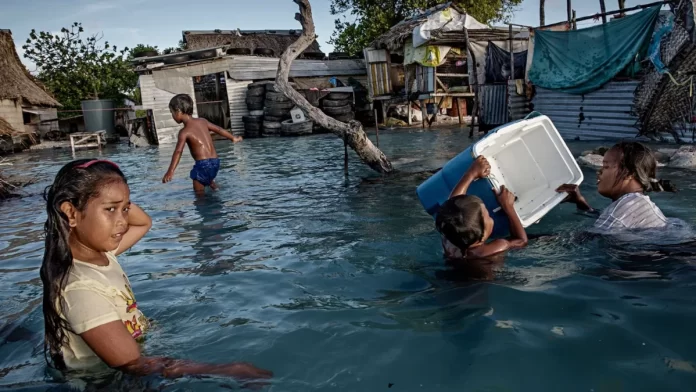Civil society groups from across Australia and the Pacific are calling on the Australian Government to champion loss and damage finance for Pacific Island countries at the upcoming Bonn UN Climate Change Conference, saying there is an urgent need to support frontline communities grappling with the escalating climate crisis.
In a joint letter led by Climate Action Network Australia (CANA) and Pacific Islands Climate Action Network (PICAN), supported by over 25 other organisations, civil society groups are urging the Australian Government to support Pacific countries’ call to include loss and damage in a new global climate finance goal under negotiation.
They also want to see the Government increase its climate finance contributions to align with its AUD$4 billion (US$2.64 billion) annual fair share, and to provide a significant, additional contribution to the global Loss and Damage Fund.
The Bonn meeting, which kicks off in Germany on Monday, is one of the last major opportunities for countries to build consensus ahead of November’s COP29 conference in Baku, Azerbaijan, where a new global goal for climate finance, the ‘New Collective Quantified Goal’ (NCQG), is set to be agreed.
As the third biggest exporter of fossil fuels globally, Australia has played a significant role in creating the climate losses and damages that will be and are being experienced by vulnerable communities.
The climate crisis has already had devastating impacts on Pacific communities. These communities face increasingly frequent and severe storms, coastal erosion, drought, and marine life loss. The organisations behind the letter say the Bonn conference is a crucial opportunity for Australia to demonstrate its commitment to the Pacific by advocating to integrate loss and damage into the NCQG and by contributing significantly to the Loss and Damage Fund with new and additional finance.
While Australia supported the establishment of the global Loss and Damage Fund at COP28, it has yet to contribute to the Fund, and its 2022-23 climate finance contributions were only about 15 percent of its fair share of the current global USD 100 billion annual climate finance target which applies through to 2025.
The organisations say that Pacific Island countries have consistently emphasised that climate change is the greatest threat to their livelihoods, security, and wellbeing, and have been strong advocates for loss and damage finance given the immense recovery costs and the severe impact on Pacific economies, societies, and cultures. In 2023, Vanuatu faced two Category 4 cyclones within just 24 hours, affecting 80 percent of the population and causing widespread destruction. Fiji, still recovering from Tropical Cyclones Yasa and Ana, has schools operating in makeshift tents years later, jeopardising children’s education.
Dr Sindra Sharma, Senior Policy Advisor Pacific Islands Climate Action Network (PICAN) said: “Including Loss and Damage in the New Collective Quantified Goal (NCQG) is crucial for addressing the urgent needs of Small Island Developing States (SIDS) and other vulnerable nations. Prioritising grant-based, non-debt-creating finance for Loss and Damage shows a genuine commitment to climate action and helps build a sustainable and equitable future.
“The time for empty promises is over. The developed world must prove their understanding by aligning with SIDS’ priorities, as expressed here in Antigua and Barbuda. Australia, a member of the Pacific Islands Forum and our closest neighbour, has repeatedly heard these priorities. They now have the opportunity to demonstrate leadership through tangible action, aligning with our needs for new and additional climate finance.
“This new era of climate finance must deliver new, adequate, and primarily public-funded, grants-based and mobilised through a “polluter pays” principle, holding those most responsible for this climate injustice accountable to their obligations under the UNFCCC and Paris Agreement. It is a matter of justice, equity and responsibility. We call on the Australian Government to step up, take decisive action, and ensure climate finance truly becomes the catalyst for the urgent climate action our planet desperately needs.”
Lyn Morgain, Oxfam Australia Chief Executive Officer said: “Supporting Pacific communities recovering from climate disasters isn’t just the right thing to do—it’s our responsibility. As those responsible for the coal and gas industries causing these problems, Australia must step up and champion loss and damage finance for Pacific Island countries to cope with climate change.”
“Australians believe in taking care of our neighbours. When we see Pacific communities suffer climate disaster after disaster, we must be leaders in calling for a global mechanism to ensure they get the funding they need to recover.”
Michelle Higelin, Action Aid Australia Executive Director said:“Australia’s fossil fuel industry is directly responsible for climate losses and damages, and it’s time our country took responsibility for this impact. If the Government is serious about showing its commitment to Pacific communities, Australia must support the inclusion of loss and damage in this landmark new finance goal.
“The new global climate finance goal is a critical opportunity to break the status quo on climate finance, and bring justice to communities most vulnerable to climate impacts. Australia has the capacity to lift its ambition and take a stand in support of our Pacific neighbours – we just need the political will.
“This is a matter of climate justice, and of gender justice. The impacts of climate change in the Pacific are disproportionately affecting women and girls, their livelihoods, safety, and wellbeing, by deepening existing gender inequities and impacting women’s lives. While women bear the brunt of climate disasters and face displacement and insecurity, they are leading the fight against climate change. We must support women on the frontlines of this crisis and ensure they have the resources to rebuild and respond.”.













